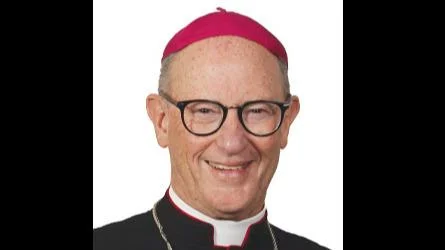
Rev. James D. Conley, D.D., S.T.L. | Diocese of Lincoln website
Throughout October, Bishop James Conley of the Diocese of Lincoln is encouraging a reflection on the theme of rebuilding in his monthly humanities syllabus. Drawing inspiration from Psalm 69:35-36, he emphasizes that "it is the Lord who saves Sion to establish a better and everlasting dwelling place for his children." Bishop Conley notes that while Christians are called to cherish and nurture their cultural heritage, ultimate hope lies beyond earthly achievements.
Referencing J.R.R. Tolkien, Bishop Conley writes: “I am a Christian, and indeed a Roman Catholic, so that I do not expect ‘history’ to be anything but a ‘long defeat’—though it contains (and in a legend may contain more clearly and movingly) some samples or glimpses of final victory.” He points out how Tolkien’s "The Lord of the Rings" illustrates rebuilding after loss, particularly through Samwise’s efforts in restoring the Shire.
Bishop Conley compares Nebraska to Tolkien's Shire, calling it "our beautiful place on earth to cherish, nurture, and protect." He highlights the importance of education within the Diocese as part of this mission. The statue “The Sower” atop Nebraska’s state capitol symbolizes both agricultural heritage and sowing seeds for future generations.
For October’s book selection, Bishop Conley recommends Virgil’s “Aeneid,” describing it as foundational for Western civilization. He shares his teacher John Senior’s perspective: “If Virgil had not written the Aeneid, we would be savages by now.” Senior argued that Virgil’s poetry helped transmit classical values even during times of upheaval.
Turning to music, Beethoven’s Seventh Symphony is highlighted for its themes of resilience following conflict. Bishop Conley describes how Beethoven’s work reflects hope and endurance despite personal and societal hardships.
In discussing art and poetry, Bishop Conley recalls the destruction and subsequent restoration of Notre Dame de Paris and Reims Cathedral. He cites Joyce Kilmer’s translation of Emile Verhaeren’s poem “The Cathedral of Rheims,” which depicts both devastation and enduring faith:
“Sacred thou art, from pinnacle to base;
And in thy panes of gold and scarlet glass
The setting sun sees thousandfold his face;...”
He also mentions the Smiling Angel statue at Reims Cathedral as a symbol of joy amid suffering.
This month’s film recommendation is “Of Gods and Men,” which tells the story of Trappist monks martyred in Algeria in 1996. Bishop Conley notes that their willingness to remain with their community during danger exemplifies spiritual rebuilding that transcends material concerns.
Concluding his message, Bishop Conley states: “Behold, I make all things new.” He encourages Catholics to continue sowing seeds for renewal even when faced with cultural decline.
The full syllabus includes:
- Book: “The Aeneid” by Virgil
- Film: “Of Gods and Men” (2010), directed by Xavier Beauvois
- Music: Beethoven's Seventh Symphony
- Poem: “The Cathedral of Rheims” by Emile Verhaeren
- Art: The Smiling Angel of Rheims Cathedral
Additional suggestions are provided for further reading, listening, viewing, and study for both adults and children.





 Alerts Sign-up
Alerts Sign-up